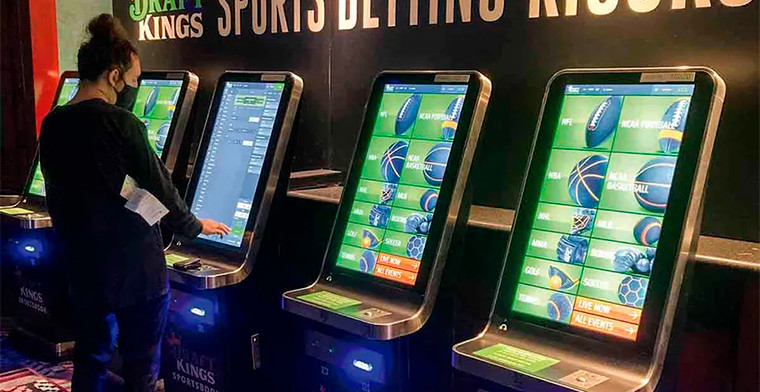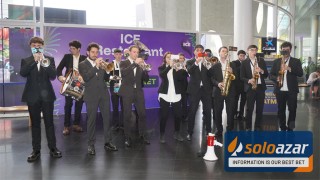Americans have gambled USD 245 B on sporting events since 2018
Monday 21 de August 2023 / 12:00
2 minutos de lectura
(Mexico City).- American gamblers can legally bet on sporting events in 34 states and Washington D.C. In 25 jurisdictions, they can do it online. Collectively, Americans have already gambled $245 billion on sports since 2018.

Dylan, a 22-year-old attorney clerk from the Jersey Shore who is battling his addiction with the help of Gamblers Anonymous, is part of a group of problem gamblers emerging alongside the regulated online gambling industry, booming in the United States (EU) since five years ago a landmark Supreme Court ruling struck down a 1992 ban on sports betting. Before 2018, those who wanted to legally bet on sports had to travel to casinos in Nevada, or in three other states that were exempt from the ban.
But since the Court's decision, sports betting has become a fast-growing tech business, with more than $12 billion in revenue by 2022 and advertising that is quickly becoming ubiquitous in American cultural life. . This same week, the sports network ESPN, owned by Disney, announced its intention to open a sports book, thus joining companies such as DraftKings, MGM and the Irish Flutter Entertainment.
Nationwide data is limited, but a study funded by the New Jersey attorney general reveals that 6 percent of people surveyed in this state - the first to approve sports betting and online gambling - are problem gamblers. , and up to 20 percent of citizens show signs of problem gambling.
Meanwhile, research from Pennsylvania, 1 of 7 jurisdictions that allow online casinos, found that 36.7 percent of people who gamble online admitted to seeing at least one problematic element in their gambling habit in the past year. The number of calls to the helpline of the National Council on Problem Gambling -- a service to help individuals, families and communities with problem gambling -- increased 21 percent year-over-year, to more than 30,000 calls and text messages in March.
Lawmakers in at least nine states, including New York and New Jersey, have proposed or passed bills this year that aim to limit the harm associated with the product, ranging from measures to crack down on associations of bets with universities until the prohibition of mentioning free and bonus bets in advertisements.
Almost two decades ago, the liberalization of UK gambling law, just as smartphones were about to take off, quickly made the UK the world's largest regulated market for online gambling. However, the rise in gambling, including addiction-related suicides, led to regulation of the operators, who have taken a nearly $252.6 million hit in regulator penalties since 2017.
The US has since overtaken the UK as the largest regulated market for online gambling, and the sector risks repeating the same mistakes “that we saw on our side of the pond”, warned Miller.
Rep. Paul Tonko, a Democratic congressman from New York, has proposed a bill to ban all electronic and online sports betting advertising.
Currently, the online gambling industry in the US is not subject to federal oversight, but rather a complicated patchwork of regulations overseen by the various states. Consumer protection is often scant, and sometimes non-existent.
Of the 25 jurisdictions with regulated online sports betting in the US, 20 have no restrictions on credit card betting. Three have no rules requiring operators to offer gamblers a tool to auto-limit deposits, amounts wagered or time spent playing.
In all, four states, including Colorado and Arkansas, do not offer any state self-exclusion programs for problem gamblers who wish to block access to gambling sites, and five others require bettors to self-exclude in person. However, betting operators offer the option to self-exclude in their own individual applications.
Despite the damage that could be unleashed, state authorities are often in conflict over tax revenue generated by sports betting, which since 2018 has already contributed more than $3.4bn cumulatively to often meager budgets.
New Jersey, which has allowed online gambling since 2013 and was instrumental in the case that led to the Supreme Court's verdict, has historically been seen as a model for proper regulation. Earlier this year, it became the first state to legally require operators to examine user data for signs of problem gambling.
And in recent months, online gambling regulators in Ohio and Massachusetts have chastised operators for misleading ads, in some cases imposing fines and enforcing strong consumer protection measures.
The aggressive promotional strategies of the companies raise controversy and several companies received fines. The torrent of ads has become so inevitable that seven sports leagues, including the NBA and NFL, formed a coalition earlier this year to promote limits on betting ads.
But Jeff Ifrah, founder of iDEA Growth, a lobbying group that represents gambling apps, says the backlash against the ads is based on assumptions people make about how little Jenny is going to steal the card. credit from his mother to play online.”
So far, the high point of the industry's aggressive drive to win over more customers is a series of controversial sponsorship deals with universities, where most students are under 21, the legal age to play. The backlash led to the cancellation of five major sponsorship deals with betting brands like Caesars and PointsBet. However, the main players in the industry argue that they go beyond the demands of regulators. FanDuel, which controls almost half of the sports betting market, says it not only bars any customer who expresses concern about their gambling habit from entering, but also proactively monitors risk factors.
"We don't need any regulator to push us in that direction, we think about it independently," insists Christian Genetski, president of FanDuel. "The tenor in the room is... to understand that there will be some volume of business that we just don't want."
Adam Greenblatt, chief executive of BetMGM, says it is in the industry's interest to "get ahead of draconian regulation." “Addiction as a disease is real… the answer is not to close all the bars,” Greenblatt says. “Our job is to help those who are vulnerable and need help… I don't want to be responsible for unnecessary suffering.” BetMGM says it launched an artificial intelligence “behavioral analysis” tool for problem gambling in two US states.
Matthew Platkin, New Jersey's attorney general, predicts his state will tighten regulation regardless of whether companies agree or not. “This is not the end of the story,” says Platkin. “Either we do it together, or they are going to force it on us, because no one can accept…a product that causes addiction and health hazards for our residents without proper safeguards.”
In 2013, the diagnostic manual of the American Psychiatric Association (APA) equated gambling addiction to drug and alcohol addiction. However, according to Keith Whyte, executive director of NCPG, it is difficult for insurance to cover gambling addiction as a primary diagnosis and usually needs to be combined with a mental health or other addiction diagnosis to obtain a referral.
Taken together, the 50 US states allocated just $110.9 million to publicly funded gambling services this year. Nine states, including Arkansas, did not provide any funding for problem gambling services last year.
Categoría:Analysis
Tags: Sin tags
País: United States
Región: North America
Event
ICE Barcelona 2026
19 de January 2026
Darío Zutel talks all about Win Systems' presence at ICE Barcelona 2026
(Barcelona, SoloAzar Exclusive).- Darío Zutel, Executive Chairman of Win Systems, reviews the results achieved at ICE Barcelona 2026, highlights the strategic quality of the contacts generated, the momentum of cashless solutions with WIN PAY, and outlines the company's innovation and expansion plans across the Americas, Europe, and other key international markets.
Monday 09 Feb 2026 / 12:00
Air Dice at ICE Barcelona 2026: Building Momentum Through Innovation and Strategic Market Expansion
(Barcelona, SoloAzar Exclusive).- In this interview, Erkki Nikunen, Partner & CBDO of Air Dice, reflects on the company’s performance at ICE Barcelona 2026, the strong reception of its FateQuest series, key industry trends shaping the sector, and Air Dice’s strategic priorities for growth, partnerships, and market expansion in 2026.
Monday 09 Feb 2026 / 12:00
Merkur Group Shines in Barcelona with Triple ICE Triumph
(Espelkamp/Barcelona).- Merkur Group secures three prestigious international accolades for operational excellence, social commitment, and standout exhibition experience.
Friday 06 Feb 2026 / 12:00
SUSCRIBIRSE
Para suscribirse a nuestro newsletter, complete sus datos
Reciba todo el contenido más reciente en su correo electrónico varias veces al mes.



















